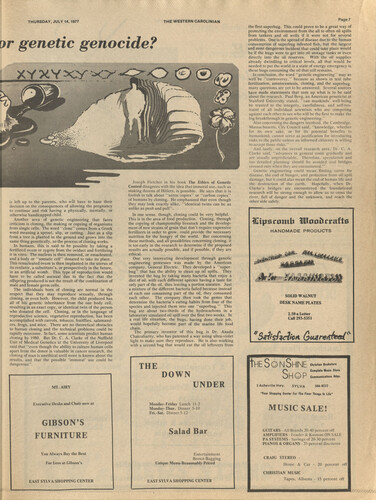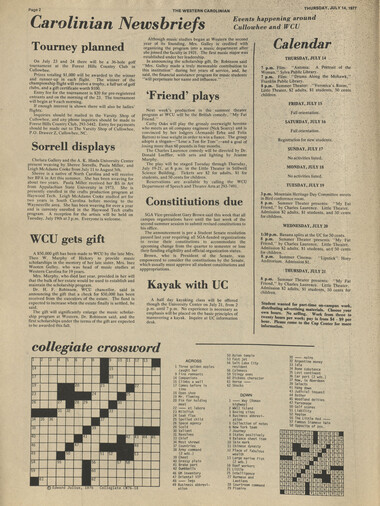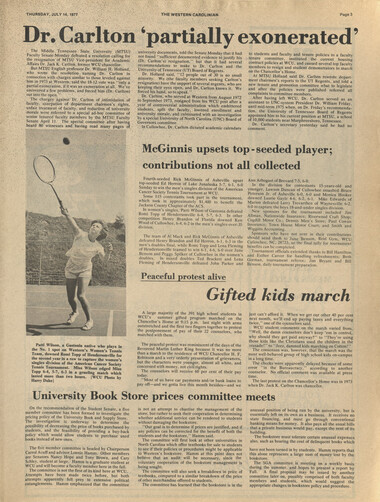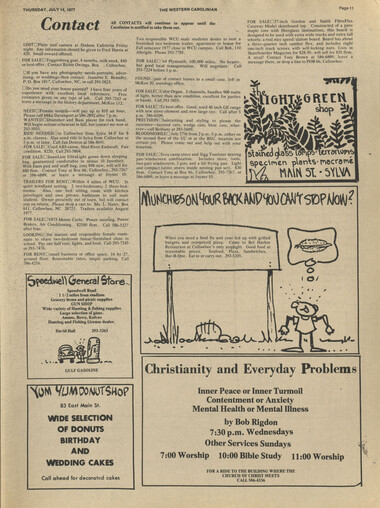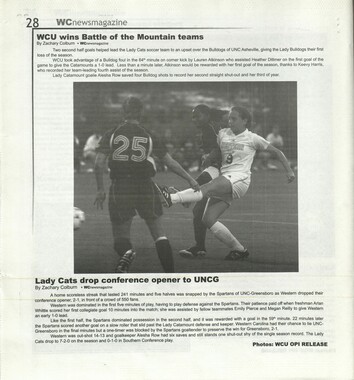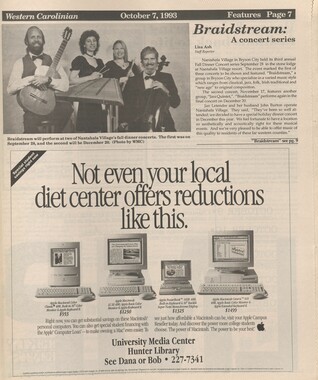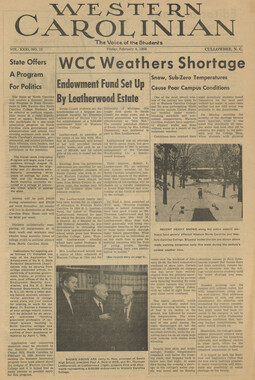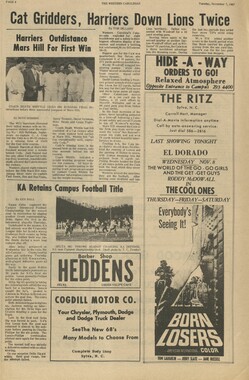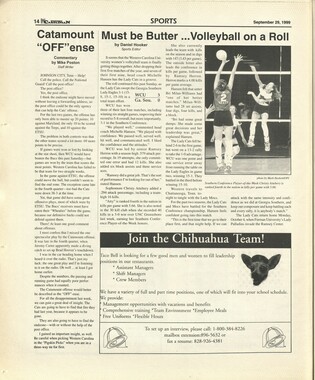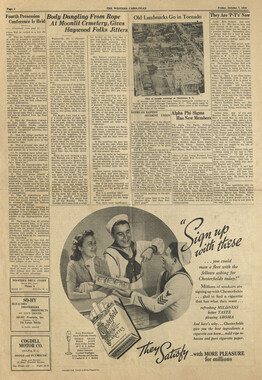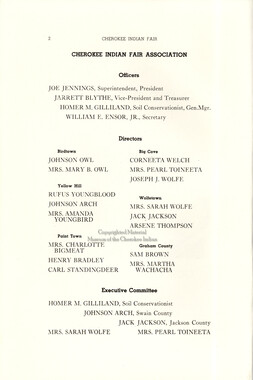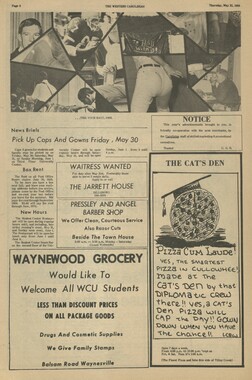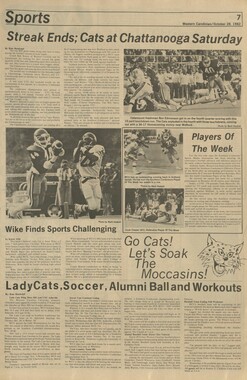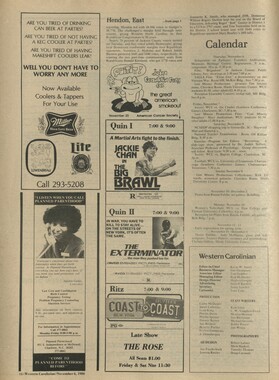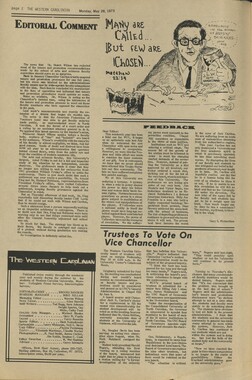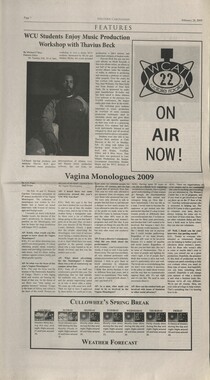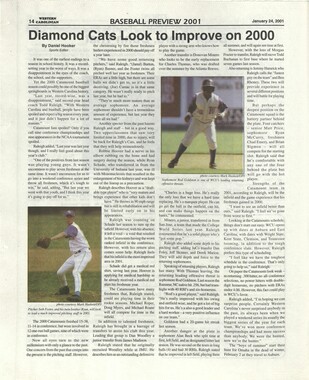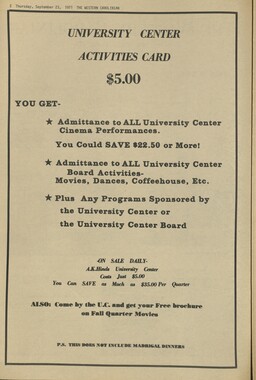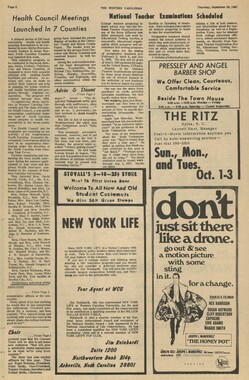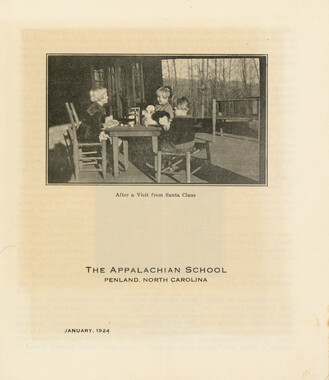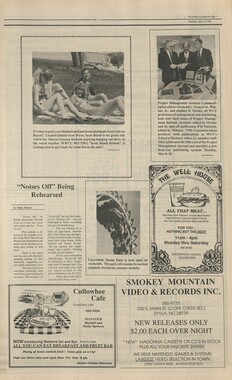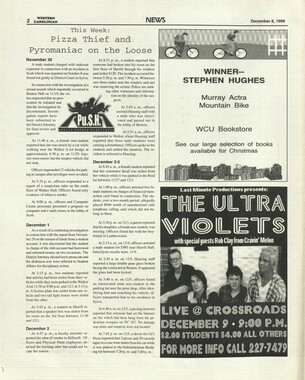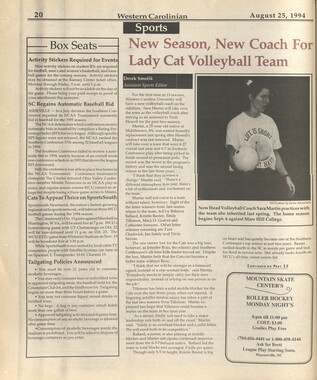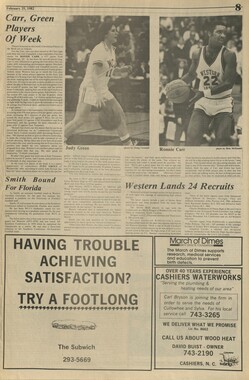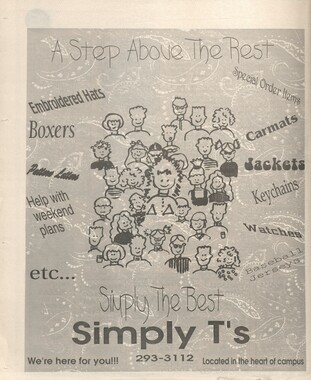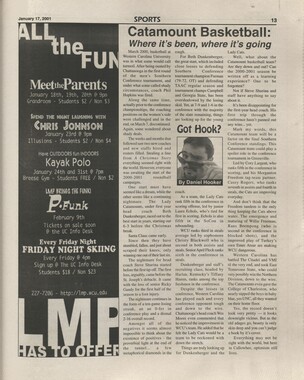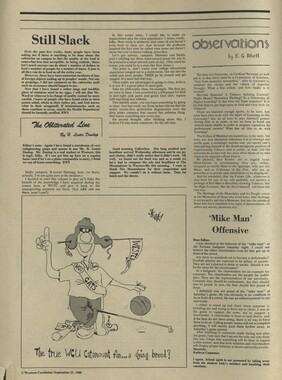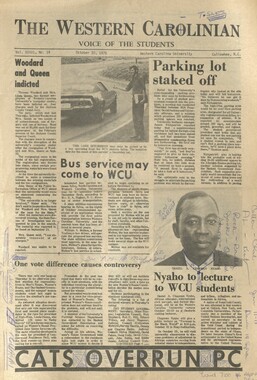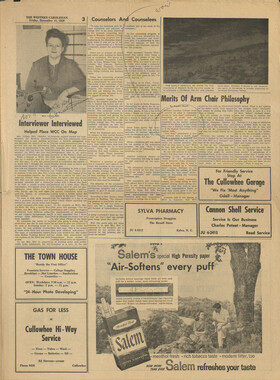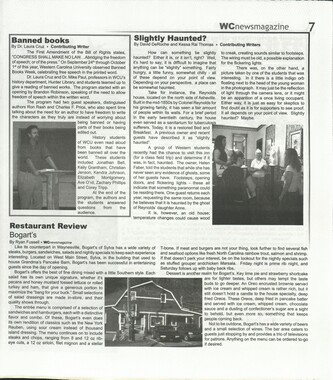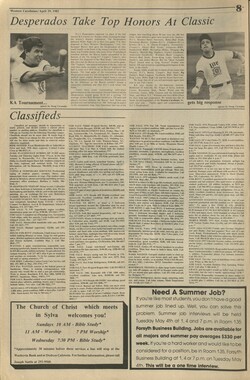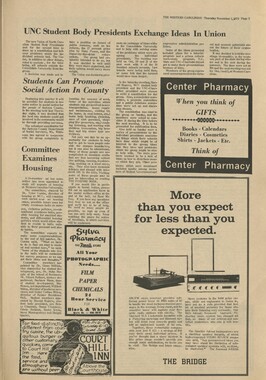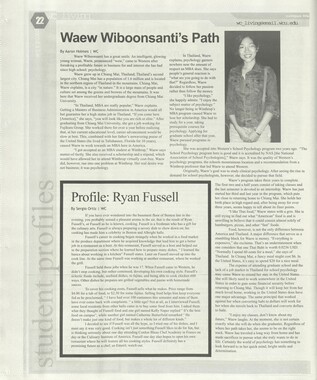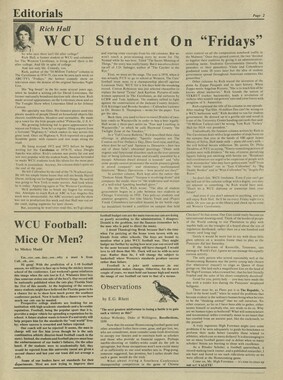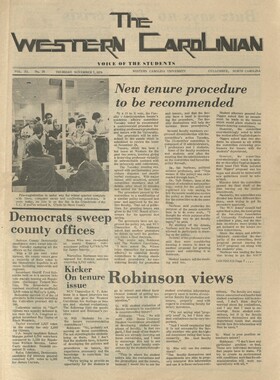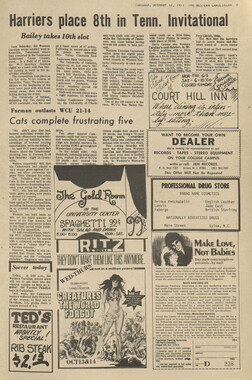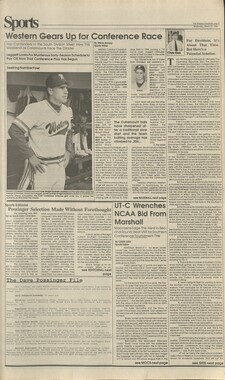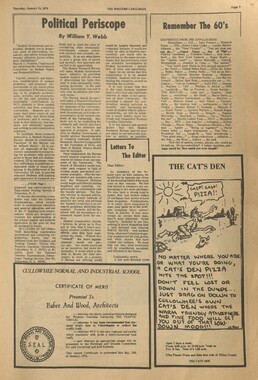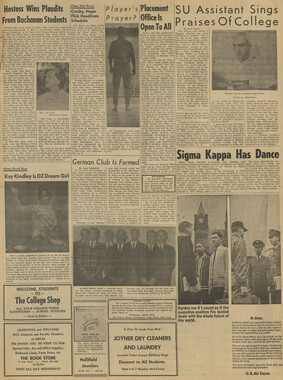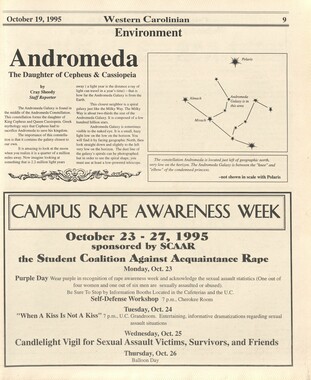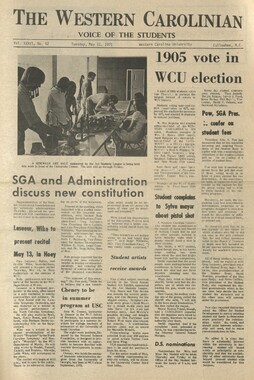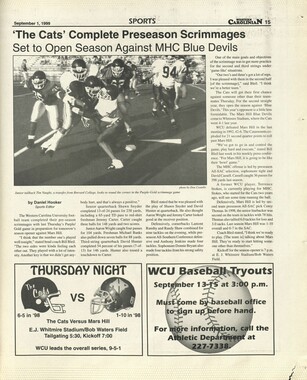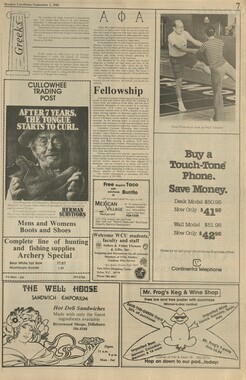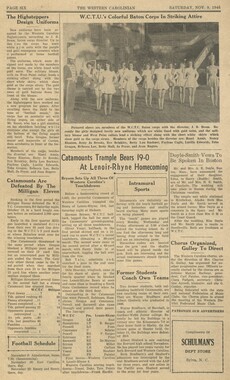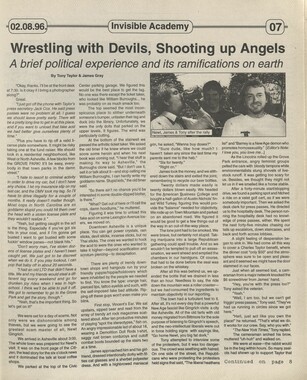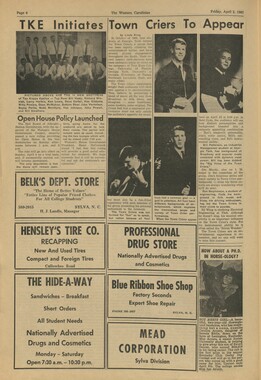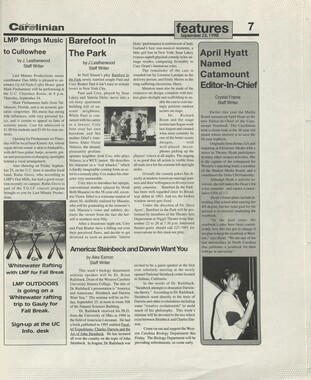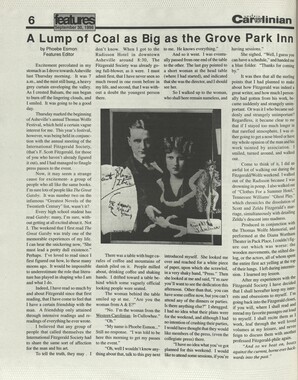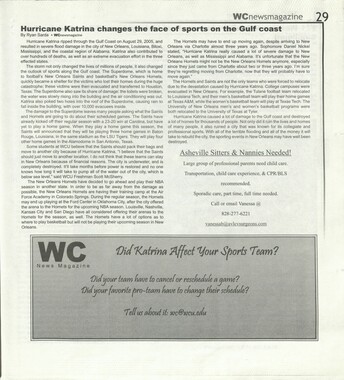Western Carolina University (21)
View all
- Canton Champion Fibre Company (2308)
- Cherokee Traditions (291)
- Civil War in Southern Appalachia (165)
- Craft Revival (1942)
- George Masa Collection (137)
- Great Smoky Mountains - A Park for America (2900)
- Highlights from Western Carolina University (422)
- Horace Kephart (973)
- Journeys Through Jackson (159)
- LGBTQIA+ Archive of Jackson County (85)
- Oral Histories of Western North Carolina (316)
- Picturing Appalachia (6797)
- Stories of Mountain Folk (413)
- Travel Western North Carolina (153)
- Western Carolina University Fine Art Museum Vitreograph Collection (129)
- Western Carolina University Herbarium (92)
- Western Carolina University: Making Memories (738)
- Western Carolina University Publications (2491)
- Western Carolina University Restricted Electronic Theses and Dissertations (146)
- Western North Carolina Regional Maps (71)
- World War II in Southern Appalachia (131)
University of North Carolina Asheville (6)
View all
- Allanstand Cottage Industries (62)
- Appalachian National Park Association (53)
- Bennett, Kelly, 1890-1974 (1463)
- Berry, Walter (76)
- Brasstown Carvers (40)
- Carver, George Washington, 1864?-1943 (26)
- Cathey, Joseph, 1803-1874 (1)
- Champion Fibre Company (233)
- Champion Paper and Fibre Company (297)
- Cherokee Indian Fair Association (16)
- Cherokee Language Program (22)
- Crowe, Amanda (40)
- Edmonston, Thomas Benton, 1842-1907 (7)
- Ensley, A. L. (Abraham Lincoln), 1865-1948 (275)
- Fromer, Irving Rhodes, 1913-1994 (70)
- George Butz (BFS 1907) (46)
- Goodrich, Frances Louisa (120)
- Grant, George Alexander, 1891-1964 (96)
- Heard, Marian Gladys (60)
- Kephart, Calvin, 1883-1969 (15)
- Kephart, Horace, 1862-1931 (313)
- Kephart, Laura, 1862-1954 (67)
- Laney, Gideon Thomas, 1889-1976 (439)
- Masa, George, 1881-1933 (61)
- McElhinney, William Julian, 1896-1953 (44)
- Niggli, Josephina, 1910-1983 (10)
- North Carolina Park Commission (105)
- Osborne, Kezia Stradley (9)
- Owens, Samuel Robert, 1918-1995 (11)
- Penland Weavers and Potters (36)
- Roberts, Vivienne (15)
- Roth, Albert, 1890-1974 (142)
- Schenck, Carl Alwin, 1868-1955 (1)
- Sherrill's Photography Studio (2565)
- Southern Highland Handicraft Guild (127)
- Southern Highlanders, Inc. (71)
- Stalcup, Jesse Bryson (46)
- Stearns, I. K. (213)
- Thompson, James Edward, 1880-1976 (226)
- United States. Indian Arts and Crafts Board (130)
- USFS (683)
- Vance, Zebulon Baird, 1830-1894 (1)
- Weaver, Zebulon, 1872-1948 (58)
- Western Carolina College (230)
- Western Carolina Teachers College (282)
- Western Carolina University (2008)
- Western Carolina University. Mountain Heritage Center (18)
- Whitman, Walt, 1819-1892 (10)
- Wilburn, Hiram Coleman, 1880-1967 (73)
- Williams, Isadora (3)
- Cain, Doreyl Ammons (0)
- Crittenden, Lorraine (0)
- Rhodes, Judy (0)
- Smith, Edward Clark (0)
- Appalachian Region, Southern (2940)
- Asheville (N.C.) (1944)
- Avery County (N.C.) (26)
- Blount County (Tenn.) (195)
- Buncombe County (N.C.) (1680)
- Cherokee County (N.C.) (283)
- Clay County (N.C.) (556)
- Graham County (N.C.) (238)
- Great Smoky Mountains National Park (N.C. and Tenn.) (525)
- Haywood County (N.C.) (3573)
- Henderson County (N.C.) (70)
- Jackson County (N.C.) (4919)
- Knox County (Tenn.) (35)
- Knoxville (Tenn.) (13)
- Lake Santeetlah (N.C.) (10)
- Macon County (N.C.) (421)
- Madison County (N.C.) (216)
- McDowell County (N.C.) (39)
- Mitchell County (N.C.) (135)
- Polk County (N.C.) (35)
- Qualla Boundary (982)
- Rutherford County (N.C.) (78)
- Swain County (N.C.) (2185)
- Transylvania County (N.C.) (270)
- Watauga County (N.C.) (12)
- Waynesville (N.C.) (86)
- Yancey County (N.C.) (72)
- Aerial Photographs (3)
- Aerial Views (60)
- Albums (books) (4)
- Articles (1)
- Artifacts (object Genre) (228)
- Bibliographies (1)
- Biography (general Genre) (2)
- Cards (information Artifacts) (38)
- Clippings (information Artifacts) (192)
- Copybooks (instructional Materials) (3)
- Crafts (art Genres) (622)
- Depictions (visual Works) (21)
- Design Drawings (1)
- Digital Moving Image Formats (2)
- Drawings (visual Works) (185)
- Envelopes (101)
- Exhibitions (events) (1)
- Facsimiles (reproductions) (1)
- Fiction (general Genre) (4)
- Financial Records (12)
- Fliers (printed Matter) (67)
- Glass Plate Negatives (381)
- Guidebooks (2)
- Internegatives (10)
- Interviews (817)
- Land Surveys (102)
- Letters (correspondence) (1045)
- Manuscripts (documents) (618)
- Maps (documents) (177)
- Memorandums (25)
- Minutes (administrative Records) (59)
- Negatives (photographs) (6090)
- Newsletters (1290)
- Newspapers (2)
- Notebooks (8)
- Occupation Currency (1)
- Paintings (visual Works) (1)
- Pen And Ink Drawings (1)
- Periodicals (193)
- Personal Narratives (10)
- Photographs (12976)
- Plans (maps) (1)
- Poetry (6)
- Portraits (4568)
- Postcards (329)
- Programs (documents) (181)
- Publications (documents) (2444)
- Questionnaires (65)
- Relief Prints (26)
- Sayings (literary Genre) (1)
- Scrapbooks (282)
- Sheet Music (2)
- Slides (photographs) (402)
- Songs (musical Compositions) (2)
- Sound Recordings (796)
- Specimens (92)
- Speeches (documents) (18)
- Tintypes (photographs) (8)
- Transcripts (324)
- Text Messages (0)
- A.L. Ensley Collection (275)
- Appalachian Industrial School Records (7)
- Appalachian National Park Association Records (336)
- Axley-Meroney Collection (2)
- Bayard Wootten Photograph Collection (20)
- Bethel Rural Community Organization Collection (7)
- Blumer Collection (5)
- C.W. Slagle Collection (20)
- Canton Area Historical Museum (2110)
- Carlos C. Campbell Collection (462)
- Cataloochee History Project (64)
- Cherokee Studies Collection (4)
- Daisy Dame Photograph Album (5)
- Daniel Boone VI Collection (1)
- Doris Ulmann Photograph Collection (112)
- Elizabeth H. Lasley Collection (1)
- Elizabeth Woolworth Szold Fleharty Collection (4)
- Frank Fry Collection (95)
- George Masa Collection (173)
- Gideon Laney Collection (452)
- Hazel Scarborough Collection (2)
- Hiram C. Wilburn Papers (28)
- Historic Photographs Collection (236)
- Horace Kephart Collection (861)
- Humbard Collection (33)
- Hunter and Weaver Families Collection (1)
- I. D. Blumenthal Collection (4)
- Isadora Williams Collection (4)
- Jesse Bryson Stalcup Collection (47)
- Jim Thompson Collection (224)
- John B. Battle Collection (7)
- John C. Campbell Folk School Records (80)
- John Parris Collection (6)
- Judaculla Rock project (2)
- Kelly Bennett Collection (1482)
- Love Family Papers (11)
- Major Wiley Parris Civil War Letters (3)
- Map Collection (12)
- McFee-Misemer Civil War Letters (34)
- Mountain Heritage Center Collection (4)
- Norburn - Robertson - Thomson Families Collection (44)
- Pauline Hood Collection (7)
- Pre-Guild Collection (2)
- Qualla Arts and Crafts Mutual Collection (12)
- R.A. Romanes Collection (681)
- Rosser H. Taylor Collection (1)
- Samuel Robert Owens Collection (94)
- Sara Madison Collection (144)
- Sherrill Studio Photo Collection (2558)
- Smoky Mountains Hiking Club Collection (616)
- Stories of Mountain Folk - Radio Programs (374)
- The Reporter, Western Carolina University (510)
- Venoy and Elizabeth Reed Collection (16)
- WCU Gender and Sexuality Oral History Project (32)
- WCU Mountain Heritage Center Oral Histories (25)
- WCU Oral History Collection - Mountain People, Mountain Lives (71)
- WCU Students Newspapers Collection (1923)
- Western North Carolina Tomorrow Black Oral History Project (69)
- William Williams Stringfield Collection (2)
- Zebulon Weaver Collection (109)
- African Americans (390)
- Appalachian Trail (35)
- Artisans (521)
- Cherokee art (84)
- Cherokee artists -- North Carolina (10)
- Cherokee language (21)
- Cherokee pottery (101)
- Cherokee women (208)
- Church buildings (190)
- Civilian Conservation Corps (U.S.) (111)
- College student newspapers and periodicals (2012)
- Dams (108)
- Dance (1023)
- Education (222)
- Floods (63)
- Folk music (1015)
- Forced removal, 1813-1903 (2)
- Forest conservation (220)
- Forests and forestry (1197)
- Gender nonconformity (4)
- Great Smoky Mountains National Park (N.C. and Tenn.) (181)
- Hunting (46)
- Landscape photography (25)
- Logging (119)
- Maps (83)
- Mines and mineral resources (9)
- North Carolina -- Maps (18)
- Paper industry (38)
- Postcards (255)
- Pottery (135)
- Railroad trains (72)
- Rural electrification -- North Carolina, Western (3)
- School integration -- Southern States (2)
- Segregation -- North Carolina, Western (5)
- Slavery (5)
- Sports (452)
- Storytelling (243)
- Waterfalls -- Great Smoky Mountains (N.C. and Tenn.) (66)
- Weaving -- Appalachian Region, Southern (280)
- Wood-carving -- Appalachian Region, Southern (328)
- World War, 1939-1945 (173)
Western Carolinian Volume 42 Number 62
Item
Item’s are ‘child’ level descriptions to ‘parent’ objects, (e.g. one page of a whole book).
-
-
THURSDAY, JULY 14, 1977 THE WESTERN CAROLINIAN or genetic genocide? is left up to the parents, who will have to base their decision on the consequences of allowing the pregnancy to continue and risk having a physically, mentally, or otherwise handicapped child. Another area of genetic engineering that faces criticism is cloning, the making or copying of organisms from single cells. The word "clone" comes from a Greek word meaning a sprout, slip, or cutting. Just as a slip from a tree is planted in the ground and grows into the same thing genetically, so the process of cloning works. In humans, this is said to be possible by taking a fertilized ovum or zygote from the oviduct and fertilizing it in vitro. The nucleus is then removed, or emacleated, and a body or "somatic cell" donated to take its place. This renucleated ovum is then implanted in the uterus of its ovulator, a substitute's, or prospectively in the future, in an artificial womb. This type of reproduction would have to be called asexual due to the fact that the offspring produced is not the result of the combination of male and female germ cells. The individuals born of cloning are normal in the respect that they may reproduce sexually, through cloning, or even both. However, the child produced has all of his genetic inheritance from the one body cell, resulting in an exact copy, or identical twin of the person who donated the cell. Cloning, or in the language of reproductive science, vegetative reproduction, has been accomplished with carrots, tobacco, fruitflies, salamanders, frogs, and mice. There are no theoretical obstacles to human cloning and the technical problems could be rapidly overcome. In fact, some scientists predict human cloning by 1980. But Dr. C. A. Clarke of the Nuffield Unit of Medical Genetics at the University of Liverpool said that "even though the ability to culture human cells apart from the donor is valuable in cancer research, the cloning of man is unethical until more is known about the results, and that the possible 'immoral' use could be dangerous". Joseph Fletcher in his book The Ethics of Genetic Control disagrees with the idea that immoral use, such as making dozens of Hitlers, is possible. He says that it is foolish to talk about "xerox copies" or "carbon copies" of humans by cloning. He emphasized that even though they may look exactly alike, "identical twins can be as unlike as push and pull". In one sense, though, cloning could be very helpful. This is in the area of food production. Cloning, through the copying of championship livestock and the development of new strains of grain that don't require expensive fertilizers in order to grow, could provide the necessary nutrition for the hungry of the world. But concerning these methods, and all possiblities concerning cloning, it is too early in the research to determine if the proposed results are actually possible, and if possible, if they are ethical. One very interesting development through genetic engineering processes was made by the American company, General Electric. They developed a "super- bug" that has the ability to clean up oil spills. They invented the bug by taking many bacteria that enjoy a diet of oil, with each different species having a taste for only part of the oil, thus leaving a portion uneaten. Just a mixture of the different bacteria failed because instead of each one consuming part of the oil, they consumed each other. The company then took the genes that determine the bacteria's eating habits from four of the species and injected them into one "superbug." This bug ate about two-thirds of the hydrocarbons in a laboratorv simulated oil spill over the first two weeks. In a real life situation, the bugs, having done their job, would hopefully become part of the marine life food chain. The primary inventor of this bug is Dr. Anada Chakrabarity, who has patented a way using ultra-violet light to make sure they reproduce. He is also working with a second bug that would eat the oil leftovers from Executive Desks and Chair now at GIBSON'S FURNITURE You Always Buy the Best For Less at Gibson's EAST SYLVA SHOPPING CENTER THE DOWN UNDER Monday-Friday Lunch 11-2 Mondav-Thur. Dinner 5-10 Fri.-Sat. Dinner 5-12 Salad Bar Entertainment Brown Bagging Unique Menu-Reasonably Priced EAST SYLVA SHOPPING CENTER Page 7 the first superbug. This could prove to be a great way of protecting the environment from the all to often oil spills from tankers and oil wells if it were not for several problems. One is the spread of disease due to the human consumption of superbug infested fish, but the largest and most dangerous incident that could take place would be if the bugs were to get into oil storage tanks or even directly into the oil reserves. With the oil supplies already dwindling to critical levels, all that would be needed to put the world in a state of energy emergency is these bugs consuming the oil that still remains. In conclusion, the word "genetic engineering" may as well be "controversy," because as shown in test tube fertilization, amniocentesis, cloning, and the superbug. many questions are yet to be answered. Several sources have made statements that sum up what is to be said about the research. Paul Berg, an American geneticist at Stanford University stated, "can mankinds' well-being be trusted to the integrity, carefullness, and sell-restraint of all individual scientists who are competing against each other to see who will be the first to make the big breakthrough in genetic engineering." Also concerning the dangers involved, the Cambridge. Massachusetts. ( ity Council said, "knowledge, whether tor its own sake, or for its potential benefits to humankind, cannot serve as justification for introducing o the publ ,-cpt t! isks. . Or. > ii'ipre werall reseat s in general come gradually and ible. Therefore, speculation and should be avoided and bridges crossed only when thc\ are encountered." Genetic engineering could mean finding cures for disease, the end of hunger, and protection from oil spill damage, but it could also mean the end of human life and the destruction of the earth. Hopefully, when Dr. Clarke's bridges are encountered the foundational research will be strong enough to allow us to cross the river, full of danger and the unknown, and reach the other side safely. Lipscomb Wood crafts HANDMADE PRODUCTS SOLID WALNUT DESK NAME PLATES ''SdisfidhA Q>u^re^ot tHES©NSHINE Shop Christian Bookstore Complete Music Store 5 Asheville Hwy. SYLVA 586-8222 "Tour Shopping Center For The Finer Things In Lite" MUSIC SALE! GUITARS - All Brands 20-40 percent off AMPLIFIERS - Fender & Kustom ON SALF. PA SYSTEMS - Savings of 20-30 percent PIANOS & ORGANS - 25 percent discounts CRAIG STEREO Home & Car - 20 percent oft CHRISTIAN MUSIC Tapes, Albums - 15 percent off
Object
Object’s are ‘parent’ level descriptions to ‘children’ items, (e.g. a book with pages).
-
The Western Carolinian is Western Carolina University’s student-run newspaper. The paper was published as the Cullowhee Yodel from 1924 to 1931 before changing its name to The Western Carolinian in 1933.
-

